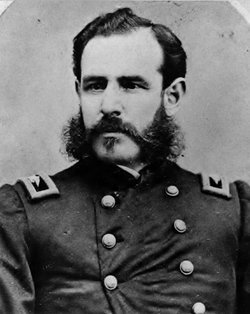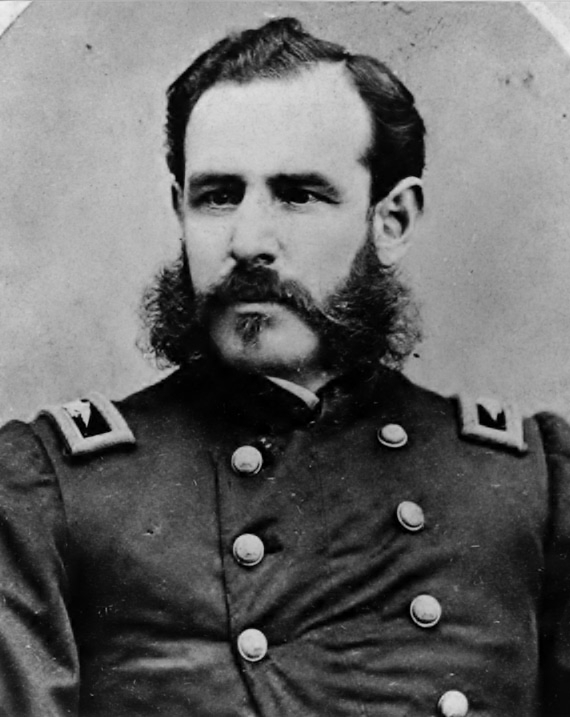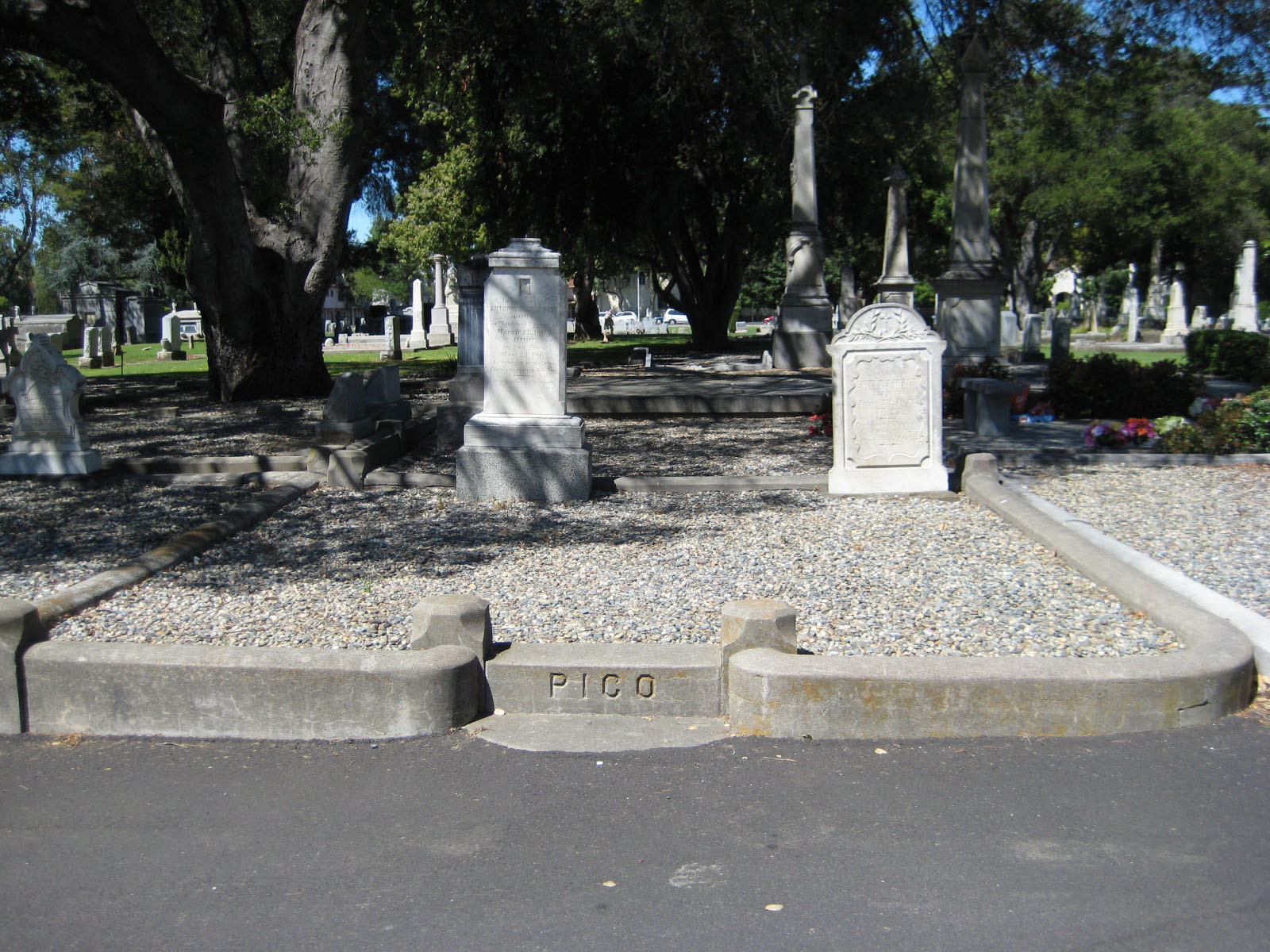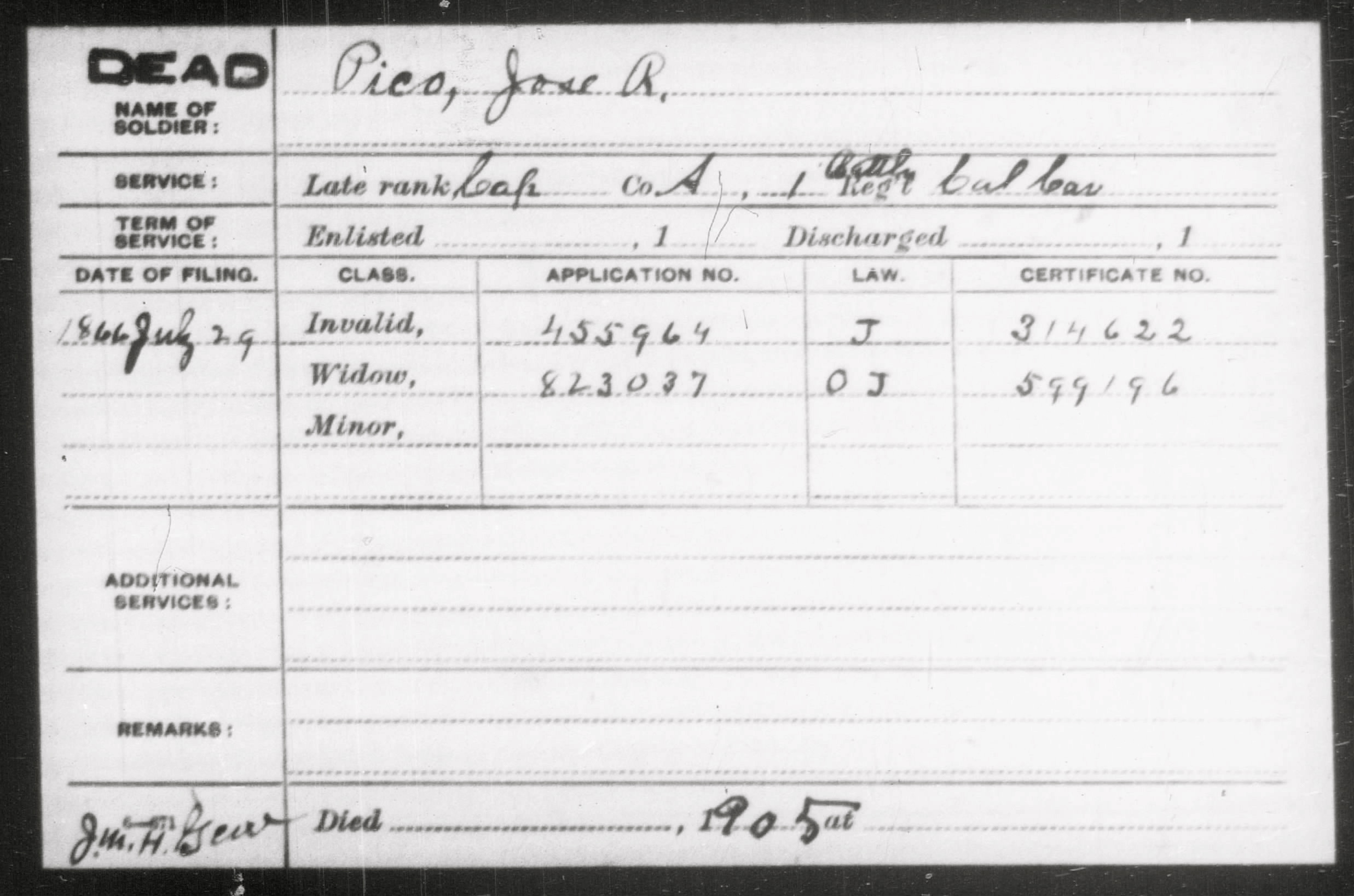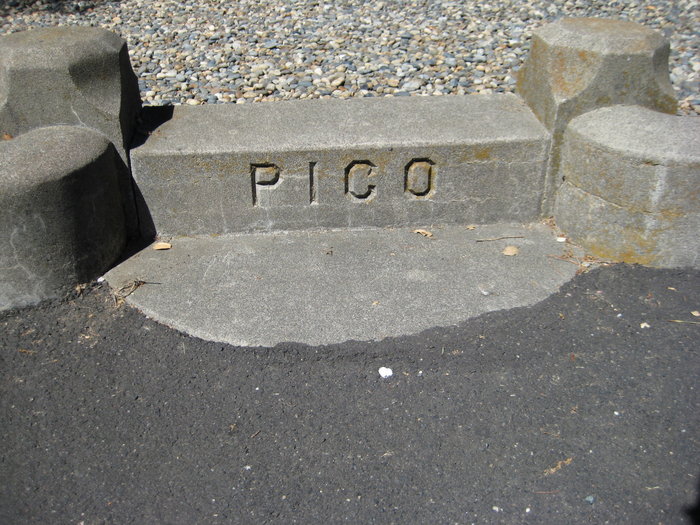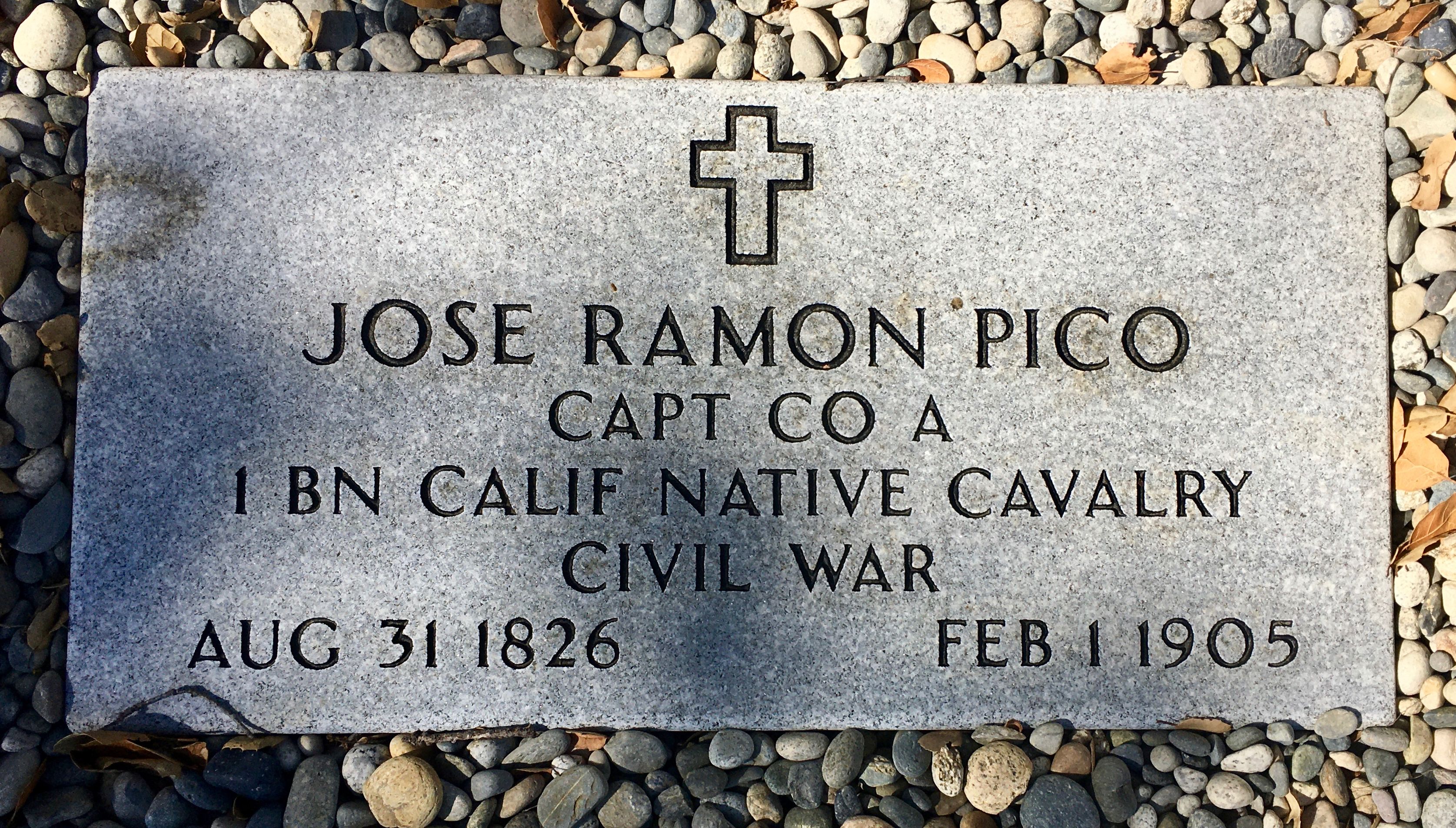Civil War: Company A, 1st Battalion, Native California Cavalry
Comrade, Fred Steele Post, No. 70, G.A.R., San Luis Obispo, California
José María de la Natividad y Reymundo [Ramón] Pico y Bernal was born at Santa Clara, Alta California, México, the legitimate son of Antonio María Pico (SC Baptism 02734) and María Pilar Bernal (SCL Baptism 06011). He was baptized at Mission Santa Clara August 9, 1832. Godparents were Antonio Suñol and his wife María [de los] Dolores Bernal (SCL Baptism 08514). As a young man Pico honed his exceptional equestrian skills while growing up during the heyday of California's rancho culture. He served as a Lieutenant in the Mexican army under his father, Antonio María Pico, during the invasion of Alta California by U. S. forces in 1846. His uncle, Pio Pico, was Alta California's last Governor under the Mexican regime, and he rode with his uncle Colonel Andrés Pico when he commanded the Californio lancers who bested Brig. Gen. Kearny at San Pasqual in December 1846. With the transfer of sovereignty in 1848 Pico became a U.S. citizen. He served a term in the first California State Legislature in 1851-52, and was elected sheriff of the district that now comprises Alameda County, Contra Costa, and Santa Clara Counties in 1852. He was unsuccessful in a subsequent bid for Alameda County sheriff in 1888. Besides his public service and real estate ventures, Pico also bred California mustangs, which he rode in equestrian shows and horse races. During a heated dispute over a horse, Pico shot and killed his cousin, Francisco Dominguez Valencia, on June 3, 1855. When the case finally went to trial in January 1859 Pico was acquitted. Pico rode 150 miles in less than 6 hours and 30 minutes to win a wager of $2,500 on November 1, 1860; his final time being 6 hours, 16 minutes, and 50 seconds. After the war, he lost a 50-mile race to John P. Smith on April 14, 1877, by less than two minutes. On a wager of $500, Pico failed his second attempt to ride 25 miles in less than one hour in November 1878; a feat he had accomplished earlier that same year with a time of 59 minutes and 6 seconds.
Pico married Anita Hall in June 1861 and they had a son, William, born later that same year. When the raising of the Native California Cavalry was authorized by Governor Stanford in January 1863, Pico enlisted on February 26 and recruited Company A from the San Jose area, paying the company's expenses out of his own pocket. In his article on the Native Cavalry Tom Prezelski writes: "On March 3, 1863, at his headquarters on the plaza in San José, [Pico] addressed the assembled crowd in the soul-stirring manner for which the men in his family were renowned: 'Sons of California! Our country calls, and we must obey! This rebellion of the southern states must be crushed; they must come back into the union and pay obedience to the Stars and Stripes. United, we will, by the force of circumstances become the freest and mightiest republic on earth! Crowned monarchs must be driven away from the sacred continent of free America!' The mention of 'Crowned monarchs' was an obvious reference to the emperor Maximilian, who enjoyed not only the support of France and conservatives in Mexico, but apparently the Rebel government in Richmond as well. Clearly, Pico sensed that sentiments linking Imperial Mexico and the Confederacy as mutual enemies of California were rife within the Spanish-surnamed community." Later in 1863, Pico escorted his recruits to the Presidio of San Francisco where he was mustered in as captain of Company A on September 7. In December his company's lances were replaced by Sharp's carbines and he sailed north by steamer to Humboldt Bay to join an ongoing campaign against the Indians in the northern part of the state. His duties included escorting prisoners, livestock, and supply trains. Company A served at Camp Curtis until September 1864, at Fort Humboldt until November, and at Fort Wright until March 1865, before going to Benicia Barracks. In May 1865 Pico's company left Benicia Barracks to join the rest of the Native Cavalry battalion at Drum Barracks near Los Angeles. In June 1865 the company departed Drum Barracks on the long march across the Mojave and Sonoran Deserts to Arizona Territory. In September 1865, while stationed at Fort Mason, Pico pursued deserters into Sonora, where at Magdalena he verbally confronted the recently installed imperialist authorities. Refusing to recognize Maximilian's puppets, he was given 24 hours to leave Mexico. On January 22, 1866, Pico departed Fort Mason to return to Drum Barracks where he was brevetted a major and mustered out on March 20. After the death of his first wife, Pico married Desea Todd about 1868 and they had two daughters, Desea Isadora, born July 18, 1869, and Catalina A., born October 1, 1873. Desea Todd was born in New York about 1836. Pico listed his profession as real estate and he was living with his family at 1123 Folsom Street in San Francisco in the 1870 census. In 1871 he unsuccessfully ran for State Treasurer in the Democratic Primary against Antonio F. Coronel, losing by a substantial margin. He was living at 553 Tehama Street in San Francisco from September 1874 until at least August 1875. A legal notice appeared in the November 27, 1878, edition of the Alta California indicating that he and Desea had filed for a divorce, although Pico and Desea were still living together in June 1880. The 1880 census shows he was a realtor renting an apartment on Montgomery Street in San Francisco and that he was living with his wife, Desea Todd, his son William, and his daughters Desea and Catalina. Their split must have been amicable, as the two kept in contact even after Pico married Jennie Hudson Greene Cutter at the Howard Street Methodist Church in San Francisco December 31, 1883. Pico filed for a Civil War veteran's disability pension July 29, 1882, and received application No. 455,964 and certificate No. 314,622. José and Jennie had no children of their own. Jennie was born in New York in February 1843. Pico lived in San Francisco at 256 Third Street from 1882 until 1883, at which time he moved to 107 Hayes Street. During an outing with his daughters to the roller rink in September 1887, Desea fell and struck her head. The blow left her unconscious for three days. Later, Pico stood by his ex-wife and daughter Catalina during Catalina's divorce from John H. Church in 1889-90. Church, 54, had induced 15-year-old Catalina to marry him without parental consent, lying about her age to the magistrate. This was Church's fourth marriage. Apparently, just a few days into the marriage, Church began beating Catalina and she ran home to her mother. Desea Isadora Pico y Todd married Lewis D. Macy at Los Angeles January 27, 1897.
Pico was active in veteran's affairs and in 1886 was a member of San Luís Obisbo's Fred Steele Post, No. 70, G. A. R. He was later affiliated with Alameda's Joe Hooker Post, No. 11. He attended the G. A. R.'s National Encampment in San Francisco in 1886. He was still active in the G.A.R. in 1895 when he attended the California and Nevada Department convention in Sacramento in April accompanied by his wife. Even in his old age, Pico's 6-foot frame cut a striking profile; and he did not take kindly to slights from man or woman, using his cane on both genders on more than one occasion. In November 1890 Pico sued the noted historian Hubert Howe Bancroft for the return of his father's personal papers, which Bancroft used to prepare his History of California and had not returned. When two burglars attempted to break into his house in the early pre-dawn hours of December 27, 1899, the 73-year-old Pico did not hesitate to find a good vantage point to pepper one of the men with bird-shot. Pico later purchased a home in Oakland at 448 Miranda Street and was living there with Jennie in June 1900. Pico took ill in early December 1904 and his condition deteriorated. He died at 1922 Broadway, Alameda, California, on February 1, 1905, from blood poisoning following a long bout with rheumatism. According to his obituary, Pico was survived by his second wife, Jennie, and his two daughters, both married and living in Los Angeles; no mention was made of his son William or his second wife Desea Todd. Jennie filed for a widow's pension March 7, 1905, and received application No. 823,037 and certificate No. 599.196. José Ramón Pico was buried next to his parents in the Pico family plot in the Santa Clara Mission Cemetery February 3, 1905.
---
Descendant of Famous Family in Financial Straits
José Ramón Pico, descendent [sic, nephew] of Pío Pico, at one time Governor of [Alta] California, is the defendant in a suit to recover $659.50 filed recently by A. Schreiber, who claims that Pico has borrowed money from him and has also secured goods for which he was never paid, says the San Francisco Call. The suit has a sad side, in that it shows to what extremities the descendent of the famous Pico family has been reduced. From January 5, 1890, alleges Schreiber, who deals in military decorations, to January 2 of this year [1902] Pico has borrowed from him $243.90 in sums ranging from 5 cents to $3.50. All these are set forth in the complaint. The interest on the loans, for which the embroiderer also asks judgment, is $103.10. The goods purchased from Schreiber by Pico, and for which the plaintiff claims he has not been paid, are principally decorations of a military nature-epaulettes, swords, badges and gold braid, such as are calculated to lend luster to the wearer on festive occasions. The loans and the goods, alleges Schreiber, were given to Pico on the strength of a claim against the State, which for several years the Castilian endeavored to have approved by California Legislatures. A bill appropriating $8,111.15, the amount of Pico's claim, was passed by the last Legislature, hence Schreiber's suit. (Daily Journal [Los Angeles], Oct. 24, 1902, 1:1)
---
Major Pico Dies After Long and Useful Life
Last Scion of Noted Mexican Family Reaches Ripe Age
His ancestors played prominent parts under the Mexican regime in California
Alameda, Feb. 1. Major José Ramón Pico, the last of the distinguished Spanish family that gave to California its last Governor under Mexican rule and its first Lieutenant Governor under United States sovereignty, passed away shortly before noon to-day at his residence, 1922 Broadway, age 78 years. Death was due to gangrene of the left foot, which resulted from an old wound. José Ramón Pico was born in San José in 1826, his father being General Antonio María Pico, who commanded the Mexican troops in California, during the war between the United States and México. Pío Pico, the last Mexican Governor of California, was an uncle of Major Pico, and Dolores Pico of Castile and California was his grandfather. Dolores Pico came to California in 1761 with a commission from the King of Spain to establish missions and conquer the Indians. General Pico, Major Pico's sire, was one of the signers of the treaty of Guadalupe Hidalgo and became a good American citizen after California passed under the control of the United States. He died impoverished, but full of honors, and to the last retained the pride of his high-born race and refused to use the language of his conquerors. Major Pico served as a lieutenant in the Mexican War under his father and participated in several battles with the American troops commanded by General John C. Frémont. At the outbreak of the Civil War he organized and equipped four troops for the First United States [sic] Cavalry. After seeing much service against the Indians he retired from the Army in 1867 with the rank of major. After years of legislative effort Major Pico was awarded $8,000 by the State of California for the assistance he had given the Northern cause during the Civil War. At one time the Pico's were owners of vast grants of land throughout California, located principally in the south. These all passed to the possession of the hustling and business bent gringo, leaving their original possessors but little better off for having owned them. Major Pico was twice married; his second wedding took place twenty-two years ago. He is survived by his second wife, Mrs. Jennie Hutchinson Pico, and two daughters by his first wife, Mrs. C. T. Bell and Mrs. D. I. Pico, both of Los Ángeles. Major Pico was a typical Spanish cavalier of the old school-proud, hospital, simple, and frank. He had all that grace of carriage and gesture, charm of voice and diction, imperiousness and dignity of spirit that were the embodiment of the historical Spanish grantee. He was of large and imposing physical physique and sprightly for one of his advanced years. Major Pico was a member of the Grand Army of the Republic, and was never more delighted than when harking back to the days before the gringo came and telling of the parts he played in the Mexican and Civil Wars. Major Pico's funeral will be held from St. Clair's Church, Santa Clara, Friday morning, and his body will be laid at rest beside the remains of his forebears in the old cemetery in the mission town. (The Call [San Francisco], 2 Feb 1905)
---
Biography by Steve
Civil War: Company A, 1st Battalion, Native California Cavalry
Comrade, Fred Steele Post, No. 70, G.A.R., San Luis Obispo, California
José María de la Natividad y Reymundo [Ramón] Pico y Bernal was born at Santa Clara, Alta California, México, the legitimate son of Antonio María Pico (SC Baptism 02734) and María Pilar Bernal (SCL Baptism 06011). He was baptized at Mission Santa Clara August 9, 1832. Godparents were Antonio Suñol and his wife María [de los] Dolores Bernal (SCL Baptism 08514). As a young man Pico honed his exceptional equestrian skills while growing up during the heyday of California's rancho culture. He served as a Lieutenant in the Mexican army under his father, Antonio María Pico, during the invasion of Alta California by U. S. forces in 1846. His uncle, Pio Pico, was Alta California's last Governor under the Mexican regime, and he rode with his uncle Colonel Andrés Pico when he commanded the Californio lancers who bested Brig. Gen. Kearny at San Pasqual in December 1846. With the transfer of sovereignty in 1848 Pico became a U.S. citizen. He served a term in the first California State Legislature in 1851-52, and was elected sheriff of the district that now comprises Alameda County, Contra Costa, and Santa Clara Counties in 1852. He was unsuccessful in a subsequent bid for Alameda County sheriff in 1888. Besides his public service and real estate ventures, Pico also bred California mustangs, which he rode in equestrian shows and horse races. During a heated dispute over a horse, Pico shot and killed his cousin, Francisco Dominguez Valencia, on June 3, 1855. When the case finally went to trial in January 1859 Pico was acquitted. Pico rode 150 miles in less than 6 hours and 30 minutes to win a wager of $2,500 on November 1, 1860; his final time being 6 hours, 16 minutes, and 50 seconds. After the war, he lost a 50-mile race to John P. Smith on April 14, 1877, by less than two minutes. On a wager of $500, Pico failed his second attempt to ride 25 miles in less than one hour in November 1878; a feat he had accomplished earlier that same year with a time of 59 minutes and 6 seconds.
Pico married Anita Hall in June 1861 and they had a son, William, born later that same year. When the raising of the Native California Cavalry was authorized by Governor Stanford in January 1863, Pico enlisted on February 26 and recruited Company A from the San Jose area, paying the company's expenses out of his own pocket. In his article on the Native Cavalry Tom Prezelski writes: "On March 3, 1863, at his headquarters on the plaza in San José, [Pico] addressed the assembled crowd in the soul-stirring manner for which the men in his family were renowned: 'Sons of California! Our country calls, and we must obey! This rebellion of the southern states must be crushed; they must come back into the union and pay obedience to the Stars and Stripes. United, we will, by the force of circumstances become the freest and mightiest republic on earth! Crowned monarchs must be driven away from the sacred continent of free America!' The mention of 'Crowned monarchs' was an obvious reference to the emperor Maximilian, who enjoyed not only the support of France and conservatives in Mexico, but apparently the Rebel government in Richmond as well. Clearly, Pico sensed that sentiments linking Imperial Mexico and the Confederacy as mutual enemies of California were rife within the Spanish-surnamed community." Later in 1863, Pico escorted his recruits to the Presidio of San Francisco where he was mustered in as captain of Company A on September 7. In December his company's lances were replaced by Sharp's carbines and he sailed north by steamer to Humboldt Bay to join an ongoing campaign against the Indians in the northern part of the state. His duties included escorting prisoners, livestock, and supply trains. Company A served at Camp Curtis until September 1864, at Fort Humboldt until November, and at Fort Wright until March 1865, before going to Benicia Barracks. In May 1865 Pico's company left Benicia Barracks to join the rest of the Native Cavalry battalion at Drum Barracks near Los Angeles. In June 1865 the company departed Drum Barracks on the long march across the Mojave and Sonoran Deserts to Arizona Territory. In September 1865, while stationed at Fort Mason, Pico pursued deserters into Sonora, where at Magdalena he verbally confronted the recently installed imperialist authorities. Refusing to recognize Maximilian's puppets, he was given 24 hours to leave Mexico. On January 22, 1866, Pico departed Fort Mason to return to Drum Barracks where he was brevetted a major and mustered out on March 20. After the death of his first wife, Pico married Desea Todd about 1868 and they had two daughters, Desea Isadora, born July 18, 1869, and Catalina A., born October 1, 1873. Desea Todd was born in New York about 1836. Pico listed his profession as real estate and he was living with his family at 1123 Folsom Street in San Francisco in the 1870 census. In 1871 he unsuccessfully ran for State Treasurer in the Democratic Primary against Antonio F. Coronel, losing by a substantial margin. He was living at 553 Tehama Street in San Francisco from September 1874 until at least August 1875. A legal notice appeared in the November 27, 1878, edition of the Alta California indicating that he and Desea had filed for a divorce, although Pico and Desea were still living together in June 1880. The 1880 census shows he was a realtor renting an apartment on Montgomery Street in San Francisco and that he was living with his wife, Desea Todd, his son William, and his daughters Desea and Catalina. Their split must have been amicable, as the two kept in contact even after Pico married Jennie Hudson Greene Cutter at the Howard Street Methodist Church in San Francisco December 31, 1883. Pico filed for a Civil War veteran's disability pension July 29, 1882, and received application No. 455,964 and certificate No. 314,622. José and Jennie had no children of their own. Jennie was born in New York in February 1843. Pico lived in San Francisco at 256 Third Street from 1882 until 1883, at which time he moved to 107 Hayes Street. During an outing with his daughters to the roller rink in September 1887, Desea fell and struck her head. The blow left her unconscious for three days. Later, Pico stood by his ex-wife and daughter Catalina during Catalina's divorce from John H. Church in 1889-90. Church, 54, had induced 15-year-old Catalina to marry him without parental consent, lying about her age to the magistrate. This was Church's fourth marriage. Apparently, just a few days into the marriage, Church began beating Catalina and she ran home to her mother. Desea Isadora Pico y Todd married Lewis D. Macy at Los Angeles January 27, 1897.
Pico was active in veteran's affairs and in 1886 was a member of San Luís Obisbo's Fred Steele Post, No. 70, G. A. R. He was later affiliated with Alameda's Joe Hooker Post, No. 11. He attended the G. A. R.'s National Encampment in San Francisco in 1886. He was still active in the G.A.R. in 1895 when he attended the California and Nevada Department convention in Sacramento in April accompanied by his wife. Even in his old age, Pico's 6-foot frame cut a striking profile; and he did not take kindly to slights from man or woman, using his cane on both genders on more than one occasion. In November 1890 Pico sued the noted historian Hubert Howe Bancroft for the return of his father's personal papers, which Bancroft used to prepare his History of California and had not returned. When two burglars attempted to break into his house in the early pre-dawn hours of December 27, 1899, the 73-year-old Pico did not hesitate to find a good vantage point to pepper one of the men with bird-shot. Pico later purchased a home in Oakland at 448 Miranda Street and was living there with Jennie in June 1900. Pico took ill in early December 1904 and his condition deteriorated. He died at 1922 Broadway, Alameda, California, on February 1, 1905, from blood poisoning following a long bout with rheumatism. According to his obituary, Pico was survived by his second wife, Jennie, and his two daughters, both married and living in Los Angeles; no mention was made of his son William or his second wife Desea Todd. Jennie filed for a widow's pension March 7, 1905, and received application No. 823,037 and certificate No. 599.196. José Ramón Pico was buried next to his parents in the Pico family plot in the Santa Clara Mission Cemetery February 3, 1905.
---
Descendant of Famous Family in Financial Straits
José Ramón Pico, descendent [sic, nephew] of Pío Pico, at one time Governor of [Alta] California, is the defendant in a suit to recover $659.50 filed recently by A. Schreiber, who claims that Pico has borrowed money from him and has also secured goods for which he was never paid, says the San Francisco Call. The suit has a sad side, in that it shows to what extremities the descendent of the famous Pico family has been reduced. From January 5, 1890, alleges Schreiber, who deals in military decorations, to January 2 of this year [1902] Pico has borrowed from him $243.90 in sums ranging from 5 cents to $3.50. All these are set forth in the complaint. The interest on the loans, for which the embroiderer also asks judgment, is $103.10. The goods purchased from Schreiber by Pico, and for which the plaintiff claims he has not been paid, are principally decorations of a military nature-epaulettes, swords, badges and gold braid, such as are calculated to lend luster to the wearer on festive occasions. The loans and the goods, alleges Schreiber, were given to Pico on the strength of a claim against the State, which for several years the Castilian endeavored to have approved by California Legislatures. A bill appropriating $8,111.15, the amount of Pico's claim, was passed by the last Legislature, hence Schreiber's suit. (Daily Journal [Los Angeles], Oct. 24, 1902, 1:1)
---
Major Pico Dies After Long and Useful Life
Last Scion of Noted Mexican Family Reaches Ripe Age
His ancestors played prominent parts under the Mexican regime in California
Alameda, Feb. 1. Major José Ramón Pico, the last of the distinguished Spanish family that gave to California its last Governor under Mexican rule and its first Lieutenant Governor under United States sovereignty, passed away shortly before noon to-day at his residence, 1922 Broadway, age 78 years. Death was due to gangrene of the left foot, which resulted from an old wound. José Ramón Pico was born in San José in 1826, his father being General Antonio María Pico, who commanded the Mexican troops in California, during the war between the United States and México. Pío Pico, the last Mexican Governor of California, was an uncle of Major Pico, and Dolores Pico of Castile and California was his grandfather. Dolores Pico came to California in 1761 with a commission from the King of Spain to establish missions and conquer the Indians. General Pico, Major Pico's sire, was one of the signers of the treaty of Guadalupe Hidalgo and became a good American citizen after California passed under the control of the United States. He died impoverished, but full of honors, and to the last retained the pride of his high-born race and refused to use the language of his conquerors. Major Pico served as a lieutenant in the Mexican War under his father and participated in several battles with the American troops commanded by General John C. Frémont. At the outbreak of the Civil War he organized and equipped four troops for the First United States [sic] Cavalry. After seeing much service against the Indians he retired from the Army in 1867 with the rank of major. After years of legislative effort Major Pico was awarded $8,000 by the State of California for the assistance he had given the Northern cause during the Civil War. At one time the Pico's were owners of vast grants of land throughout California, located principally in the south. These all passed to the possession of the hustling and business bent gringo, leaving their original possessors but little better off for having owned them. Major Pico was twice married; his second wedding took place twenty-two years ago. He is survived by his second wife, Mrs. Jennie Hutchinson Pico, and two daughters by his first wife, Mrs. C. T. Bell and Mrs. D. I. Pico, both of Los Ángeles. Major Pico was a typical Spanish cavalier of the old school-proud, hospital, simple, and frank. He had all that grace of carriage and gesture, charm of voice and diction, imperiousness and dignity of spirit that were the embodiment of the historical Spanish grantee. He was of large and imposing physical physique and sprightly for one of his advanced years. Major Pico was a member of the Grand Army of the Republic, and was never more delighted than when harking back to the days before the gringo came and telling of the parts he played in the Mexican and Civil Wars. Major Pico's funeral will be held from St. Clair's Church, Santa Clara, Friday morning, and his body will be laid at rest beside the remains of his forebears in the old cemetery in the mission town. (The Call [San Francisco], 2 Feb 1905)
---
Biography by Steve
Family Members
Sponsored by Ancestry
Advertisement
Advertisement
